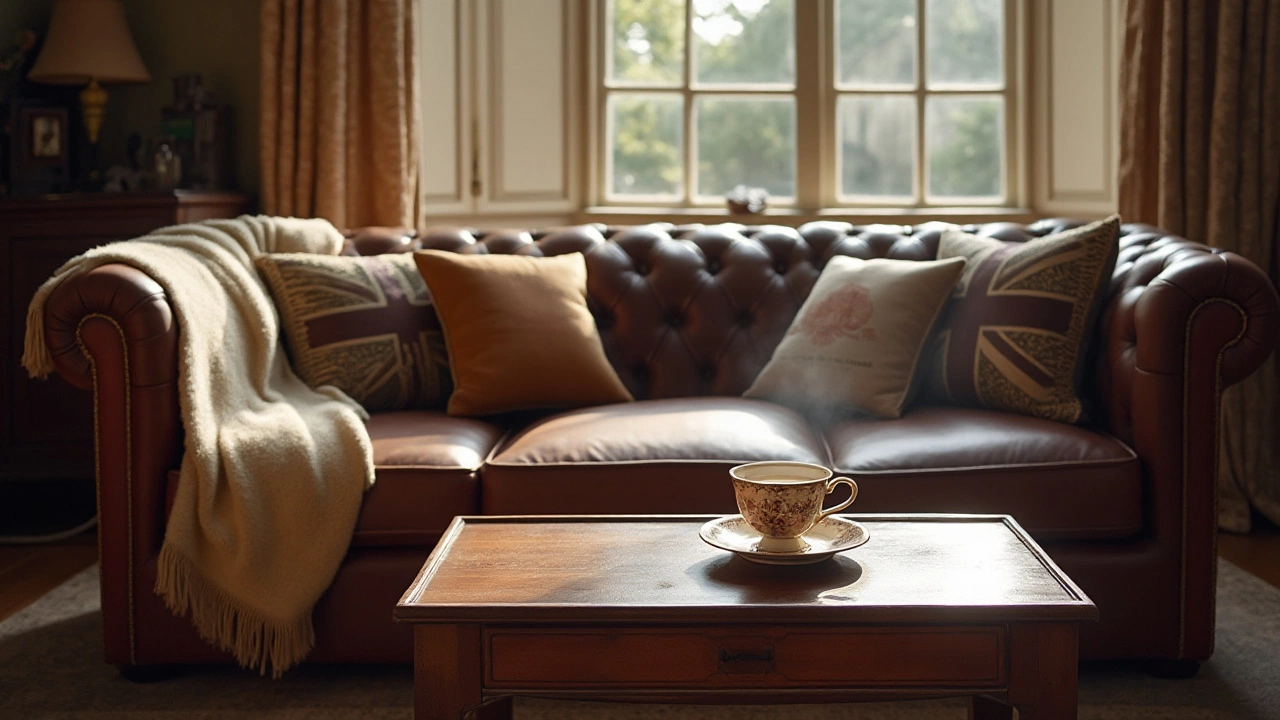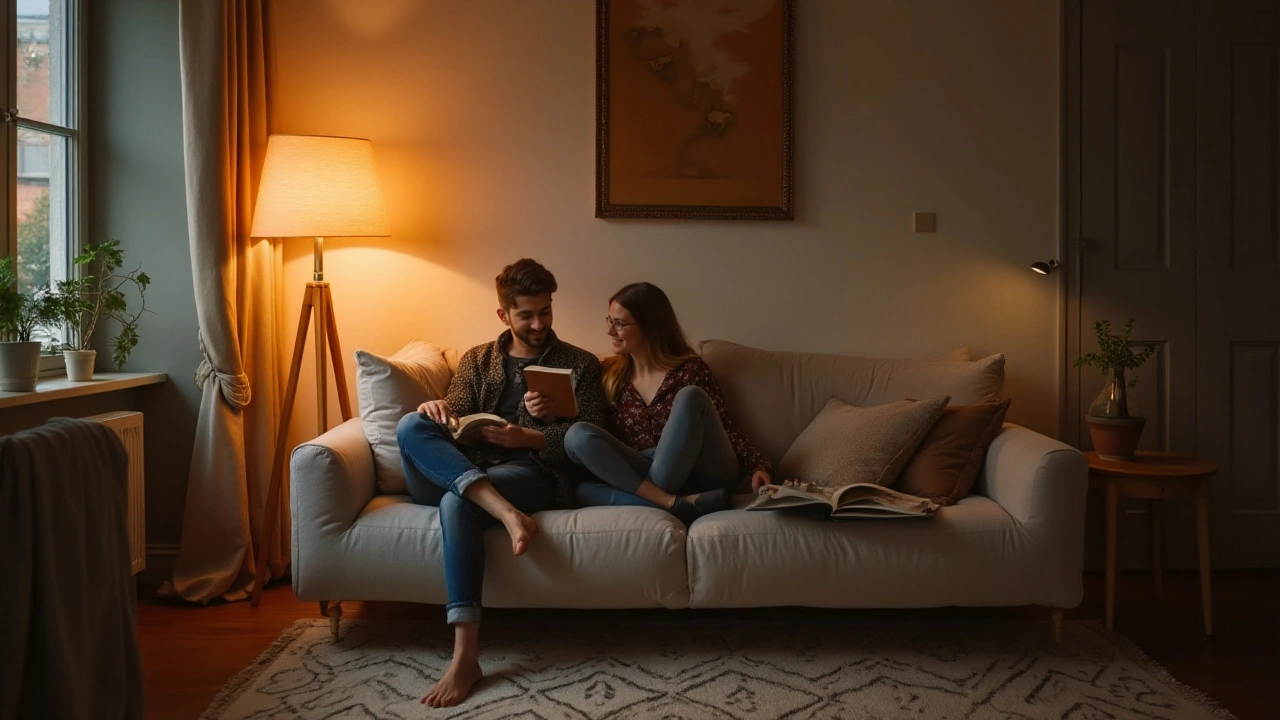Deciding Between Firm and Soft Sofas: What Suits You Best?
 Oct, 13 2024
Oct, 13 2024
When it comes to picking out the perfect sofa, one of the first decisions you'll face is whether you want something firm or soft. It's a choice that can make a big difference in how you enjoy your next TV binge, book reading session, or casual get-together.
For some, a firm sofa is ideal, offering solid support and a structured look. It's particularly good if you have a penchant for sitting upright or value sleek lines. On the other end, a soft sofa might just be the comfort haven you crave, with its plush seating inviting you to sink in and relax.
But your choice doesn't just affect comfort—it can also have implications for your posture and overall well-being. And let's not forget about lifestyle factors, like how many people will use the sofa and how it fits in with the rest of your decor. We'll dive into all these aspects to help make your sofa decision a little easier.
- The Appeal of a Firm Sofa
- The Comfort of Soft Sofas
- Ergonomics and Health Considerations
- Lifestyle and Practicality
- Balancing Style and Functionality
The Appeal of a Firm Sofa
Opting for a firm sofa can bring a touch of elegance and sophistication to your living space. One of the most compelling features of firm sofas is their ability to provide robust support, which is vital for many homeowners. It can be especially appealing to those who value a clean, structured form above everything else. The sturdy construction of a firm sofa does not just offer visual appeal, but it can also support your back, promoting a healthier sitting posture. Sitting on a firm sofa means you do not sink deep into the cushions, making it easier to get up, which might be advantageous for older adults or those with mobility issues.
Another notable benefit is durability. Sofas with firmer cushions tend to maintain their shape over time, which is crucial for preserving the sofa's appearance and offering longevity. Unlike their softer counterparts that may sag and lose form, firm cushions can withstand years of use without showing significant signs of wear. This could mean fewer replacements, saving money in the long run. Additionally, a study once indicated that firmer seating options are less prone to dust accumulation, helping promote a healthier home environment.
Firm sofas are often favored by individuals who entertain often. Firm seating tends to make a space feel more formal, and some hosts feel that it promotes better social interactions. People can sit upright and be more engaged, rather than sinking deep into relaxation. This can especially be handy in spaces that serve multiple purposes, like a living room that doubles as a home office.
"A firm sofa can transform a room from casual to elegant, making a statement about your personal style." - Home Design Weekly
Consider the aesthetic versatility as well. Firm sofas typically come with tailored designs, providing a classic or modern look that can suit a variety of home decors. Whether you're going for a minimalist theme or something more traditional, a firm sofa can enhance the style rather than battling against it. And while the main draw is structural integrity, manufacturers offer a range of high-quality upholstery options that do not compromise on comfort.
It's interesting to note that in large households and homes with young children, a firm sofa often becomes the cornerstone of functionality and style. The tough build can withstand the pouncing of excited kids and is easy to clean after inevitable spills, making it a practical choice for family life. Additionally, it is easier to find matching elements in the room, from coffee tables to armchairs, that complement the straight lines and solid form of a firm sofa.
Let's not forget the range of uses beyond the traditional setting. In offices or waiting areas, firm sofas are the go-to choice, providing a professional vibe that softer options might lack. This reinforces the importance of environment-appropriate furniture choices; a firm sofa easily adapts to its context while staying true to its inherent qualities of resilience and support.
The Comfort of Soft Sofas
Ah, the delight of sinking into a soft sofa! It's like wrapping yourself in a cozy, plush embrace after a long day. The allure of a soft sofa often lies in its capacity to provide a sense of relaxation and escape from the rigidity of daily life. For many, it's the comfort sensation that can be irresistible. Imagine plopping down into inviting cushions that seemingly mold to your every curve, making each seating experience a luxurious affair. This is precisely why many choose a soft sofa over a firmer alternative.
Soft sofas typically use materials like feather or down-filled cushions, offering that sink-in sensation some people can't get enough of. The upholstery might often be made from fabrics like velvet or chenille, adding to the tactile pleasure of your lounging experience. It's not uncommon for these sofas to be the centerpiece of a room, inviting guests to sit and stay a while amid its comforting hold. Moreover, a soft sofa is a perfect spot for laying back with a good book or snuggling up during a movie night.
However, comfort isn't just about the feel—it's also about how well a sofa supports you over time. A common concern with softer options is the potential for sagging. The plushness, while inviting, means the fill may compress with extended use. This aspect is crucial when considering the longevity of the sofa's comfort. Regular fluffing of cushions can mitigate some of these effects, helping maintain that cushiony goodness.
Beyond just personal relaxation, a soft sofa supports an informal lifestyle. It's the type of seating that welcomes everyone from playful pets to rambunctious kids. Soft sofas are especially well-suited to family rooms, where comfort takes precedence over formality. They can serve various functions, from hosting friends to providing an impromptu bed for overnight guests.
It's interesting to note a survey by Furniture Today magazine, which found that 62% of people preferred softer seating for relaxation spaces in their homes. This highlights a leaning toward comfort styles in contemporary home settings. There's something undeniably attractive about the instantly inviting nature of such sofas.
Soft sofas aren't without their critics, though. Some argue that while they may offer a cozy option, they could lack the support needed for good posture, which is a crucial factor, especially for those who spend extended hours sedentary. Still, the sheer comfort that a soft sofa offers can't be denied. As the famous interior designer Jonathan Adler once said,
"Comfort is king when it comes to decorating your home. Choose pieces that make you feel good, both physically and visually."

Ergonomics and Health Considerations
When choosing between a firm sofa and a soft sofa, considering how each affects your health and ergonomics is crucial. The way a sofa supports your body can have long-term impacts on your posture and health. Firm sofas usually provide better support for the spine, maintaining its natural curve while you sit. This is particularly beneficial if you or your family members spend prolonged periods sitting, possibly working from home or engaging in desk-bound activities. A well-supported back reduces the risk of developing chronic back pain, a concern many face today.
On the other hand, a soft sofa offers a kind of cozy, enveloping comfort. While it feels luxurious to sink into a cloud-like couch, it can sometimes lack the necessary support for good posture. Sinking too deep might lead to slouching, which can strain muscles and put undue pressure on the lumbar region. For those who enjoy sprawling out while watching TV or gaming, this might not pose a significant issue, but for someone with existing back problems, it could potentially exacerbate their condition. Consequently, choosing a sofa with health in mind depends largely on personal needs and existing health conditions.
Experts in ergonomics suggest that a sofa should allow for natural movement and provide adequate support without being overly restrictive. Dr. Alice Smith, an ergonomics specialist, advises:
"A supportive sofa doesn’t need to be hard as a rock, but it should give adequate backing to your lower back and let you change positions with ease."Her words encapsulate the essence of balancing comfort with health considerations. A well-designed sofa should align with your usual seating habits and ergonomic principles.
There's an additional factor to consider: the activity you'll most often engage in while seated on your sofa. For social gatherings and conversing, upright positions facilitated by a firm sofa might be more suitable. Conversely, a soft sofa that lets you sink in can make for excellent lounging during solo relaxation or intimate gatherings. Studies have shown that comfort and sore body parts can affect our mood, so investing in the right sofa not only impacts physical health but mental well-being as well.
A smart buyer might even consider testing a sofa before buying it, much like one might with a mattress. Spending ten to fifteen minutes replicating usual seating positions can provide insights into how the sofa might contribute to either comfort or discomfort in a typical setting. Don’t shy away from this practice, as it might save you from future regret. Ultimately, choosing the right sofa becomes a careful balance of how it relates to your lifestyle, personal health needs, and the specific roles it will play in your daily life.
Lifestyle and Practicality
When deciding between a firm or a soft sofa, lifestyle and practicality should not be overlooked. Think about who will be using the sofa on a daily basis. If you have a bustling household with active children and pets, the durability of a firm sofa might appeal to you. Firm cushions tend to hold their shape better over time, withstanding energetic toddler play sessions or the occasional paw print without showing wear. On the flip side, a soft sofa could become the family favorite, offering a cozy retreat after a long day. It's not uncommon for people to feel more at ease curling up on a plush couch, making it an inviting centerpiece for family gatherings.
The choice between firm and soft sofas is also heavily influenced by the layout and size of your living space. A sleek, structured sofa can create the illusion of more space, fitting snugly into sharper corners and demarcating open living areas with a modern touch. This can be especially beneficial in compact apartments where maximizing square footage is crucial. In contrast, a room with ample space might benefit from the inviting sprawl of a large, soft sofa, which can double as an added seating area when guests drop by unannounced.
Cleaning and maintenance are realistic concerns that often tip the scales for undecided buyers. Firm cushions are typically easier to clean, which can be a boon if your living room doubles as the dining room—or if you have kids who love their snacks. On the other hand, while soft cushions may require a bit more upkeep to look pristine, they often come with removable covers that make washing them a feasible task rather than a daunting chore. As you weigh these factors, consider this insight from home interior expert Lucy Cheng. She notes,
“Choosing the right sofa is about aligning with your lifestyle; it's about understanding how you live and what you need your furniture to support.”Her advice suggests that your sofa should be more than just a seating option; it should cater to the nuances of your daily life.

Balancing Style and Functionality
Finding the perfect sofa requires a delicate dance between its aesthetic appeal and practical use. Many people dream of a living room centerpiece that's both a visual delight and a practical piece of furniture. When choosing between a firm or soft sofa, style and functionality need to walk hand in hand. Aesthetically speaking, you'll want a sofa that complements your décor—a cornerstone of living room style. A modern interior may benefit from sleek lines of a firm sofa, while a bohemian setup might revel in the inviting contours of a softer option. Design is not just about appearances; it reflects a sense of harmony, a way of blending different elements into a cohesive whole that resonates with your personal taste.
But style alone does little when comfort and usability fall short. Functionality should come into play, ensuring that the sofa serves its intended purpose. Whether you love lounging with a book, entertaining guests, or simply having a nap on a lazy afternoon, your choice of sofa should fit seamlessly into your lifestyle. A soft sofa might tempt those who love to sink in after a long day at work, offering a haven of relaxation. Meanwhile, a firm sofa could prove excellent for maintaining posture, offering a structured environment where family and guests can sit comfortably for hours on end. Maximizing style should not compromise comfort. Think of the experiences you desire—experiment with some options.
Sofa comfort doesn't solely depend on the material's firmness but also how it suits individual needs in practice. It often helps to analyze how often and in what way the sofa will be used. In households with kids or pets, durability may rank higher than style. In such cases, opting for materials that withstand wear and tear yet retain their charm matters. Alternatively, families who frequently host parties might consider sofas that offer more seating and encourage conversation. Visiting a variety of stores can provide perspective; sometimes sitting on a particular model reveals aspects invisible to the eye. Don't shy away from taking measurements or trying different fabric swatches to judge what fits best with your daily demands.
Integrating other furniture pieces also comes into the equation; complementing couches, rugs, and decor highlights the sofa's role in the room's ecosystem. Color schemes, textures, and patterns need to be considered along with functionality. An effortlessly cohesive room can elevate anyone's mood. As interior designer Nate Berkus says,
"Your home should tell the story of who you are and be a collection of what you love."It's this balance of love for design with practicality that makes a space truly yours. Rather than focusing on trends that change each season, think about the synergy between pieces, a formula that retains pleasure and function alike.
Including a balance of style and functionality can translate into an investment that pays off not just aesthetically but emotionally and socially. It enhances the way you interact with your space, impacting day-to-day living experiences. The secret lies in blending your core values with design sensibilities to create a harmonious environment that nurtures you and every visitor crossing your door. Your choice of sofa is a thoughtful intersection of personal expression and suited utility—an extension of who you are and who you aspire to be, comfortably encased in elegance and purpose.